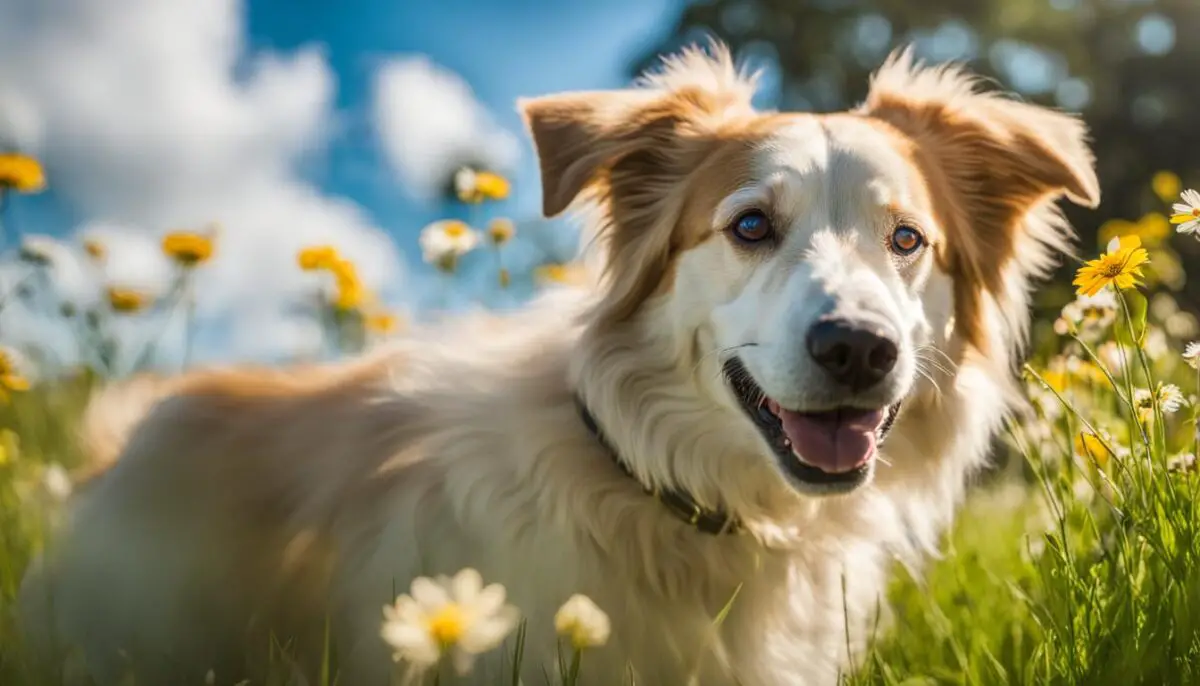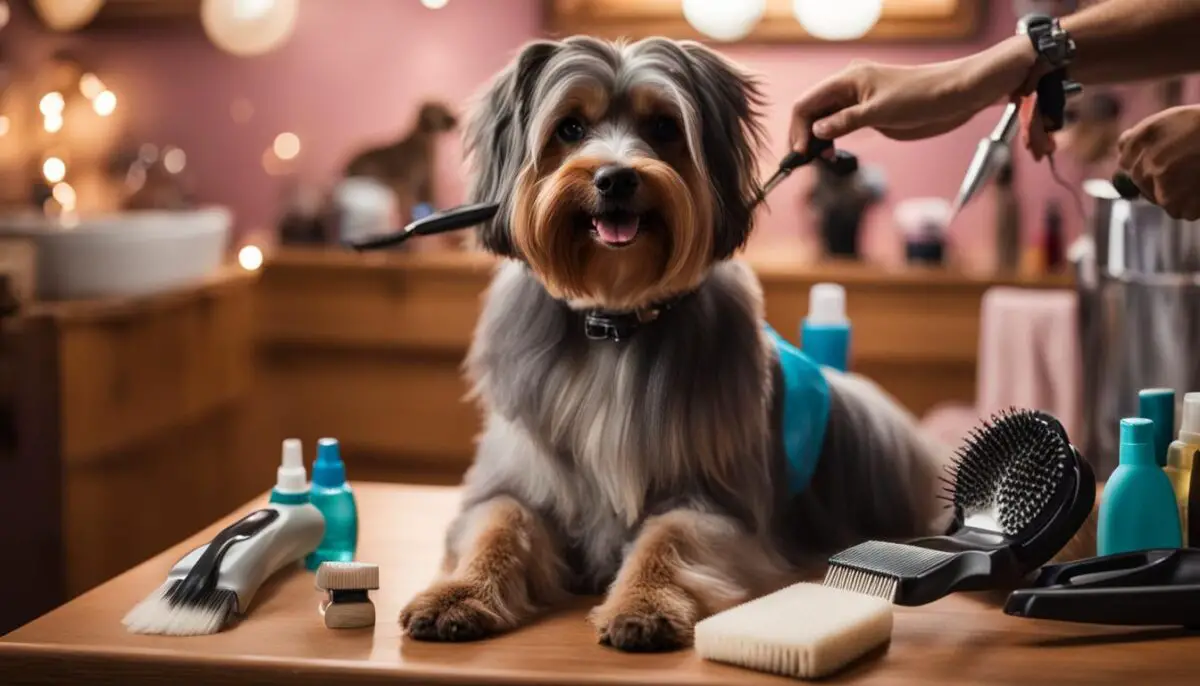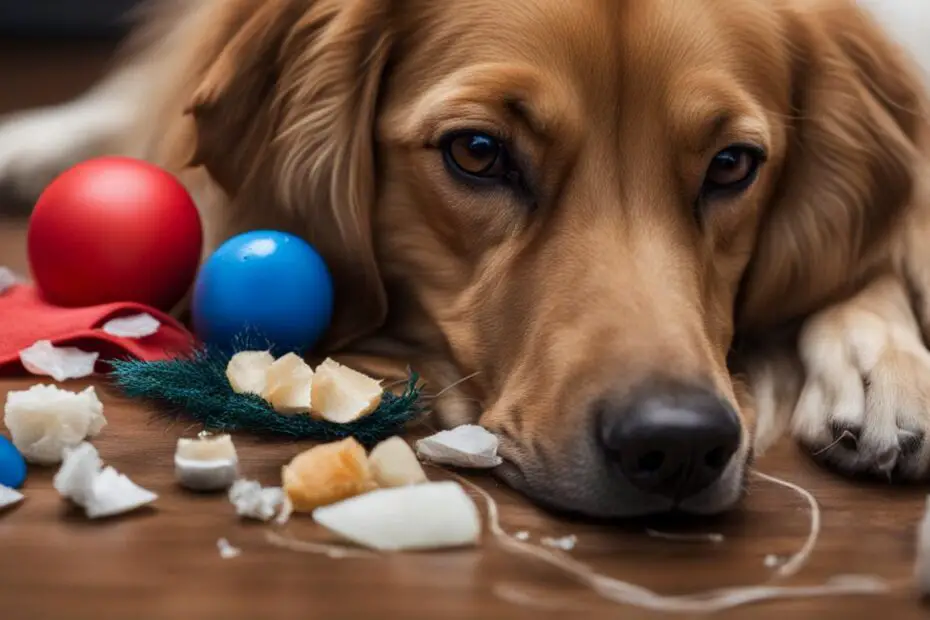If you’re wondering why your dog has a bad odor, you’re not alone. Many pet owners have experienced this issue with their furry friends. There can be several reasons why your dog smells bad, and it’s essential to understand them to tackle the problem effectively.
One possible reason for your dog’s bad odor is their environment. Dogs can pick up scents from various sources, such as grass or hay, which can stick to their fur and cause an unpleasant smell. Additionally, smaller dogs may absorb the scents of their owners’ detergents or perfumes, adding to the odor factor.
However, bad dog odor can also be a symptom of underlying medical issues. Secondary yeast or bacterial infections on the skin or inside the ears can lead to a foul smell. Allergies can contribute to itching and licking, which can result in infections and lingering odors. If you notice signs of discomfort, changes in the skin and coat, or an increase in odor intensity, it’s crucial to take your dog to the vet for proper diagnosis and treatment.
While home remedies may seem tempting, it’s best to stick to treatments prescribed by your vet. Vet-prescribed products often contain higher concentrations of key ingredients that effectively address the underlying issues causing the odor. Regular care and attention to your dog’s hygiene, along with timely visits to the vet, can help prevent and eliminate bad dog odor.
Key Takeaways:
- Several reasons can contribute to your dog smelling bad, including their environment and underlying medical issues.
- Bad odor may be a sign of secondary yeast or bacterial infections, allergies, or other medical conditions.
- Consulting a vet for proper diagnosis and treatment is crucial to address the root cause of your dog’s bad odor.
- Avoid using home remedies and stick to vet-prescribed products for effective results.
- Regular care, hygiene practices, and vet visits can help prevent and eliminate bad dog odor.
Common Causes of Dog Odor and How to Freshen Up Your Furry Friend
As a pet parent, it’s important to be aware of the common causes of dog odor and how you can keep your furry friend smelling fresh. There are several factors that can contribute to that unpleasant smell, but with proper grooming and care, you can prevent and control dog odor.
Dogs with Skin Folds
Skin folds, commonly found in breeds like bulldogs and pugs, can be a breeding ground for bacteria and yeast. The moisture trapped between the folds creates an ideal environment for infections, leading to a foul smell. Regular cleaning and drying of the skin folds can help prevent these infections and keep your dog smelling good.
Impacted Anal Glands
Another common cause of dog odor is impacted anal glands. These glands, located near the anus, can become blocked or infected, resulting in a strong odor. Dogs may drag their bottoms along the carpet to relieve the discomfort. If you notice your dog doing this, it’s important to take them to the vet for expression of the anal glands.
Poor Dental Hygiene
Bad breath in dogs can be a sign of poor dental hygiene. Just like humans, dogs need regular dental care to prevent plaque buildup and gum disease, which can contribute to an unpleasant odor. Regular brushing of your dog’s teeth and providing dental chews can help keep their breath fresh and their overall odor under control.
Diet and Food Allergies
The food your dog eats can also play a role in their odor. Certain foods can cause skin infections and emit a foul-smelling oil. Food allergies can also contribute to itching and licking, leading to odor-causing infections. It’s important to feed your dog a high-quality diet that meets their nutritional needs and to consult with a veterinarian if you suspect food allergies.
To freshen up your furry friend and prevent dog odor, there are a few steps you can take:
- Regularly brush your dog’s fur to remove loose hair and dirt that can trap odors.
- Consider patting your dog down with corn starch, which can help absorb excess moisture and odors.
- Wash your dog’s bedding regularly to eliminate any odors that may be trapped there.
It’s also important to provide your dog with regular veterinary care. A veterinarian can address any underlying medical issues that may be contributing to the odor and recommend appropriate treatments.
With consistent grooming, proper oral care, and a balanced diet, you can keep your furry friend smelling fresh and reduce common causes of dog odor.

How to Get Rid of Bad Dog Smell: Tips and Solutions
If you’re dealing with a bad dog smell, there are several tips and solutions to help eliminate it. Regular bathing is essential, but it’s important not to overdo it. Most dogs only need to be bathed once a month, and excessive bathing can lead to dry skin.
Avoid using home remedies and stick to vet-recommended shampoos that contain ingredients like lipids and ceramides to protect the skin. Covering up the smell with spray-on fragrances or perfumes can actually cause more skin irritation, so it’s best to let the medicine prescribed by your vet do its work.
In some cases, the bad odor may be indicative of an underlying medical issue, so it’s important to seek veterinary care if the smell persists or worsens. Implementing a regular dog grooming routine, including brushing their fur, cleaning their ears, trimming their nails, and maintaining their dental hygiene, can also help prevent and control dog odor.
Here are some tips and solutions to help get rid of bad dog smell:
- Bathe your dog regularly, but not too frequently, using vet-recommended shampoos.
- Follow proper grooming practices, including brushing their fur to remove dirt and dead hair.
- Clean your dog’s ears regularly to prevent bacterial and yeast infections.
- Trim your dog’s nails to avoid dirt buildup and potential infections.
- Maintain your dog’s dental hygiene by brushing their teeth and providing dental treats.
Remember, maintaining your dog’s overall hygiene and seeking veterinary care when needed can go a long way in preventing and eliminating bad dog odor.
Expert Tip:
“Regular grooming plays a crucial role in controlling dog odor. By following a consistent grooming routine and using vet-recommended products, you can keep your furry friend fresh and smelling great!”

| Tip | Description |
|---|---|
| Bathe your dog regularly | Use vet-recommended shampoos and avoid overbathing. |
| Brush their fur | Remove dirt and dead hair by regularly brushing your dog’s fur. |
| Clean their ears | Regularly clean your dog’s ears to prevent infections. |
| Trim their nails | Keep your dog’s nails trimmed to avoid dirt buildup and infections. |
| Maintain dental hygiene | Brush your dog’s teeth and provide dental treats for good dental health. |
Reasons Why Your Dog Still Smells After a Bath and How to Address Them
If you’ve given your dog a bath but notice that they still have a lingering odor, there could be underlying reasons that need to be addressed. Here are some common causes and solutions:
Skin Inflammation or Infection
One possible reason for your dog’s persistent smell is skin inflammation or infection. These conditions can cause an unpleasant odor that doesn’t go away with bathing alone. It’s important to consult a vet for proper diagnosis and treatment. They can recommend medicated shampoos or other topical treatments to address the underlying issue.
Ear Infections
Ear infections can also contribute to a foul smell. If your dog has an ear infection, it’s crucial to use a mild ear cleaner specifically formulated for dogs and seek veterinary advice. Your vet may prescribe medications or recommend cleaning solutions to help eliminate the odor and treat the infection.
Dental Issues
Poor dental hygiene can lead to bad breath and contribute to the overall odor of your dog. Plaque buildup and gingival hyperplasia can be common dental issues that cause persistent bad breath. To address this, you can use chew toys and dental hygiene treats that promote oral health. Regular teeth brushing and professional dental cleanings recommended by your vet can also improve your dog’s dental hygiene and eliminate the associated odor.
Poor Quality Food and Diet
The food your dog consumes can also affect their body odor. Poor quality food and an unbalanced diet can contribute to a persistent bad smell. It’s crucial to provide a high-quality diet for your pet, ensuring they receive proper nutrition. Consult with your vet to determine the best diet plan for your dog’s specific needs and address any dietary issues that may be causing the odor.
By addressing these underlying issues, you can eliminate the lingering smell from your dog and restore their freshness. Remember to consult with your vet for proper diagnosis and treatment. Implementing a regular grooming routine, maintaining good dental hygiene, and providing a high-quality diet can help keep your beloved furry friend smelling clean and fresh.
| Reasons | How to Address Them |
|---|---|
| Skin Inflammation or Infection | Consult a vet for proper diagnosis and treatment. Use medicated shampoos or topical treatments. |
| Ear Infections | Use a mild ear cleaner specifically formulated for dogs. Seek veterinary advice for proper treatment. |
| Dental Issues | Use chew toys and dental hygiene treats. Regular teeth brushing and professional dental cleanings recommended by the vet. |
| Poor Quality Food and Diet | Provide a high-quality diet recommended by the vet. Ensure proper nutrition and balanced meals. |
Conclusion
Understanding the reasons why your dog smells bad and implementing appropriate solutions can help keep your furry friend fresh and odor-free. Whether it’s addressing medical issues, maintaining proper hygiene, or providing a high-quality diet, taking care of your dog’s overall well-being is key. Regular visits to the vet, proper grooming practices, and using vet-prescribed products can effectively eliminate bad dog odor.
Remember, it’s important to seek professional advice and avoid using home remedies that may worsen the problem. By following these tips and guidelines, you can enjoy a clean and fresh-smelling companion.
FAQ
Why does my dog smell bad?
There can be several reasons why your dog smells bad, including environmental factors, medical conditions, allergies, and poor hygiene. It’s important to identify the underlying cause and seek appropriate treatment.
What are the common causes of dog odor?
Dog odor can be caused by skin infections in folds, impacted anal glands, poor dental hygiene, and diet. Understanding these common causes can help you address the issue and prevent odor.
How can I freshen up my dog to reduce odor?
Regular brushing, using corn starch to pat them down, and washing their bedding can help freshen up your furry friend. Maintaining their overall hygiene and addressing any medical issues are also important.
How can I get rid of bad dog smell?
Regular bathing with vet-recommended shampoos, maintaining proper grooming practices, and seeking veterinary care for underlying medical issues can help eliminate bad dog smell. Avoiding home remedies and using vet-prescribed products is crucial.
Why does my dog still smell after a bath?
If your dog still smells after a bath, it could be due to skin inflammation or infection, ear infections, dental issues, or poor diet. Consulting a vet and following their advice can help address these issues and eliminate the lingering smell.
How can I eliminate dog odor for good?
Eliminating dog odor for good involves understanding the root cause, focusing on proper hygiene practices, providing a high-quality diet, and regular veterinary care. By addressing these factors, you can keep your dog fresh and odor-free.

